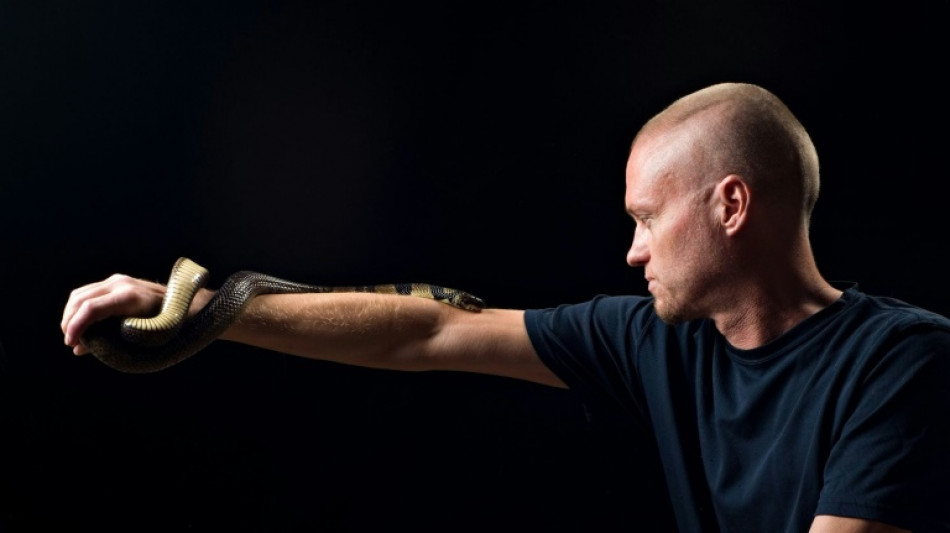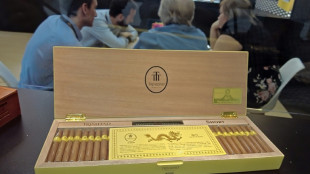
-
 Lillard matches NBA 3-point contest mark in injury return
Lillard matches NBA 3-point contest mark in injury return
-
NBA mulling 'every possible remedy' as 'tanking' worsens

-
 Team USA men see off dogged Denmark in Olympic ice hockey
Team USA men see off dogged Denmark in Olympic ice hockey
-
'US-versus-World' All-Star Game divides NBA players

-
 Top seed Fritz beats Cilic to reach ATP Dallas Open final
Top seed Fritz beats Cilic to reach ATP Dallas Open final
-
Lens run riot to reclaim top spot in Ligue 1, Marseille slip up

-
 Last-gasp Zielinski effort keeps Inter at Serie A summit
Last-gasp Zielinski effort keeps Inter at Serie A summit
-
Vinicius bags brace as Real Madrid take Liga lead, end Sociedad run

-
 Liverpool beat Brighton, Man City oust Beckham's Salford from FA Cup
Liverpool beat Brighton, Man City oust Beckham's Salford from FA Cup
-
Australia celebrate best-ever Winter Olympics after Anthony wins dual moguls

-
 Townsend becomes a fan again as Scotland stun England in Six Nations
Townsend becomes a fan again as Scotland stun England in Six Nations
-
France's Macron urges calm after right-wing youth fatally beaten

-
 China's freeski star Gu recovers from crash to reach Olympic big air final
China's freeski star Gu recovers from crash to reach Olympic big air final
-
Charli XCX 'honoured' to be at 'political' Berlin Film Festival

-
 Relatives of Venezuela political prisoners begin hunger strike
Relatives of Venezuela political prisoners begin hunger strike
-
Trump's 'desire' to own Greenland persists: Danish PM

-
 European debate over nuclear weapons gains pace
European debate over nuclear weapons gains pace
-
Newcastle oust 10-man Villa from FA Cup, Man City beat Beckham's Salford

-
 Auger-Aliassime swats aside Bublik to power into Rotterdam final
Auger-Aliassime swats aside Bublik to power into Rotterdam final
-
French prosecutors announce special team for Epstein files

-
 Tuipulotu 'beyond proud' as Scotland stun England
Tuipulotu 'beyond proud' as Scotland stun England
-
Jones strikes twice as Scotland end England's unbeaten run in style

-
 American Stolz wins second Olympic gold in speed skating
American Stolz wins second Olympic gold in speed skating
-
Marseille start life after De Zerbi with Strasbourg draw

-
 ECB to extend euro backstop to boost currency's global role
ECB to extend euro backstop to boost currency's global role
-
Canada warned after 'F-bomb' Olympics curling exchange with Sweden

-
 Ultra-wealthy behaving badly in surreal Berlin premiere
Ultra-wealthy behaving badly in surreal Berlin premiere
-
250,000 at rally in Germany demand 'game over' for Iran's leaders

-
 UK to deploy aircraft carrier group to Arctic this year: PM
UK to deploy aircraft carrier group to Arctic this year: PM
-
Zelensky labels Putin a 'slave to war'

-
 Resurgent Muchova beats Mboko in Qatar final to end title drought
Resurgent Muchova beats Mboko in Qatar final to end title drought
-
Farrell hails Ireland's 'unbelievable character' in edgy Six Nations win

-
 Markram, Jansen lead South Africa to brink of T20 Super Eights
Markram, Jansen lead South Africa to brink of T20 Super Eights
-
Guehi scores first Man City goal to kill off Salford, Burnley stunned in FA Cup

-
 Swiss say Oman to host US-Iran talks in Geneva next week
Swiss say Oman to host US-Iran talks in Geneva next week
-
Kane brace helps Bayern widen gap atop Bundesliga

-
 Ireland hold their nerve to beat gallant Italy in Six Nations thriller
Ireland hold their nerve to beat gallant Italy in Six Nations thriller
-
European states say Navalny poisoned with dart frog toxin in Russian prison

-
 Braathen hails 'drastic' changes after Olympic gold
Braathen hails 'drastic' changes after Olympic gold
-
De Minaur eases past inconsistent Humbert into Rotterdam final

-
 Eurovision 70th anniversary live tour postponed
Eurovision 70th anniversary live tour postponed
-
Cuba cancels cigar festival amid economic crisis

-
 Son of Iran's last shah urges US action as supporters rally in Munich
Son of Iran's last shah urges US action as supporters rally in Munich
-
Jansen helps South Africa limit New Zealand to 175-7

-
 Braathen wins unique Winter Olympic gold for Brazil, Malinin seeks answers
Braathen wins unique Winter Olympic gold for Brazil, Malinin seeks answers
-
Relatives of Venezuela political prisoners begin hunger strike after 17 freed

-
 Ten-man West Ham survive Burton battle to reach FA Cup fifth round
Ten-man West Ham survive Burton battle to reach FA Cup fifth round
-
International crew set to dock at space station

-
 Suryakumar says India v Pakistan 'not just another game'
Suryakumar says India v Pakistan 'not just another game'
-
Brazilian Olympic champion Braathen is his own man - and Norway's loss


Man who let snakes bite him 200 times spurs new antivenom hope
Tim Friede was feeling particularly down on the day after the September 11 attacks, so he went to his basement and let two of the world's deadliest snakes bite him.
Four days later, he woke up from a coma.
"I know what it feels like to die from snakebite," Friede told AFP via video call from his home in the small US town of Two Rivers, Wisconsin.
This experience might put most people off snakes entirely, but Friede simply vowed to be more careful next time.
From 2000 to 2018, he allowed himself to be bitten by snakes more than 200 times. He also injected himself with their venom over 650 times.
Friede endured this pain because he wanted to achieve total immunity to venom, a practice called mithridatism which should not be tried at home.
After a couple of years, Friede started to believe he could be the basis for a better kind of antivenom. The former truck mechanic, who does not have a university degree, long struggled to be taken seriously by scientists.
But last month, a study published in the prestigious Cell journal showed that antibodies from his blood protect against a range of snake venom.
The researchers now hope Friede's hyper-immunity could even lead to the development of a universal antivenom.
This would fill a major need, because currently most antivenoms only cover one or a few of the world's 600 venomous snakes.
Up to 138,000 people are killed by snakebites a year, while 400,000 suffer amputations or other disabilities, according to the World Health Organization.
These figures are believed to be vastly underestimated because snakebite victims typically live in poorer, remote areas.
- 'Pain every time' -
Friede's first bite was from a harmless garter snake when he was five years old.
"I was afraid, I cried, I ran away," said Friede, now 57.
Then he started bringing snakes home and hiding them in pickle jars. His mother sought counselling, but his interest in snakes persisted.
Things escalated after Friede attended a class that taught him how to "milk" snakes for their venom.
How antivenom is made has changed little over the last 125 years.
Small doses of snake venom are injected into animals such as horses, which produce antibodies that can be extracted and used as antivenom.
However this antivenom usually only works for bites from that particular species of snake -- and it includes other antibodies from horse that can cause serious side-effects including anaphylactic shock.
"I thought, well, if they make antivenom in horses, why can't I just use myself as a primate?" Friede said.
He started working through the venom from all the deadly species he could get his hands on, such as cobras, taipans, black mambas and rattlesnakes.
"There is pain every time," he said.
- 'Proud' -
For years, the scientists he contacted to take advantage of his immunity refused to bite.
Then in 2017, immunologist Jacob Glanville, who previously worked on universal vaccines, turned his attention towards antivenom.
Glanville told AFP he had been looking for "a clumsy snake researcher who'd been bit accidentally a couple times," when he came across a video of Friede taking brutal back-to-back snake bites.
When they first spoke, Glanville said he told Friede: "I know this is awkward, but I would love to get my hands on some of your blood."
"I've been waiting for this call for a long time," came the response, Glanville said.
The antivenom described in the Cell paper includes two antibodies from Friede's blood, as well as a drug called varespladib.
It offered mice full protection against 13 of the 19 snake species tested, and partial protection for the remaining six.
The researchers hope a future cocktail will cover far more snakes -- particularly vipers -- with further trials planned on dogs in Australia.
Timothy Jackson of the Australian Venom Research Unit praised the immunological research, but questioned whether a human needed to be involved, pointing to synthetically developed antibodies.
Glanville said the ultimate goal of his US-based firm Centivax was to develop a universal antivenom administered by something like an EpiPen, potentially produced in India to keep the costs down.
Friede said he was "proud" to have made a "small difference" in medical history.
Now working for Centivax, Friede stopped self-inflicting himself with venom in 2018 to save the firm from liability issues.
But he hopes to get bitten by snakes again in the future.
"I do miss it," he said.
A.Malone--AMWN


